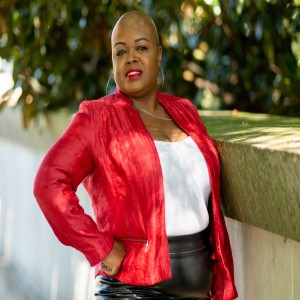The Fix
The Fix is a podcast that shares stories of women and men who are taking action and innovating to advance equality in the workplace and beyond.
The Fix is a podcast that shares stories of women and men who are taking action and innovating to advance equality in the workplace and beyond.
Episodes

Wednesday Oct 12, 2022
Laura Bates: How To Fix Systems Of Inequality
Wednesday Oct 12, 2022
Wednesday Oct 12, 2022
This week’s podcast features a former guest Laura Bates, who is the founder of the Everyday Sexism Project, an ever-increasing collection of over 200,000 testimonies of gender inequality, with branches in 25 countries worldwide.
Laura writes regularly for the Guardian, Telegraph and the New York Times amongst others and won a British Press Award for her journalism in 2015. She has written numerous books, and her latest Fix The System Not The Women is near and dear to our hearts with its message.
When it comes to gender inequality, most people can agree that we need to tackle obvious forms of discrimination, like sexual harassment and sexual assault. But this agreement doesn’t always extend to covert forms of discrimination, like consistently devaluing women’s contributions in a team meeting, or only asking women on a team to take notes. But we have to appreciate the interrelationship between different forms of sexism and discriminatory systems. As Laura put it in a piece for the Guardian “It is vital to resist those who mock and criticize us for tackling “minor” manifestations of prejudice, because these are the things that normalize and ingrain the treatment of women as second-class citizens, opening the door for everything else, from workplace discrimination to sexual violence.” If we are going to solve inequality, we have to address the various ways that it shows up, at work and the workplace is a really important part of this equation.
Discussions like today’s can feel overwhelming but there is always something we can do to effect positive change. Yes gender inequality is a systemic issue, but it’s created through the beliefs, behaviors and interactions we each engage in, which means we have the power, collectively, to dismantle it. Laura shared some important actions we can all do more of.
Action One: Raise our voices and demand the system needs to change. Too often inequality is taken for granted as the way things are, but when we question this and call it out we raise awareness of what needs to change.
Action Two: Lend your voices to support active change, place your signature on that campaign. For example, Laura shared that the Center for Women's Justice is running a campaign where they are pushing for a statutory inquiry into misogyny within policing. So that's something that all of us can support and lend our voices to, our signatures to that petition.
Action Three: Stop blaming others within the workplace and focusing on individuals when things happen, to dismantle inequality we all need to take small consistent acts each and every day.
The Everyday Sexism Project
Fix The System Not The Women

Wednesday Oct 05, 2022
Dolly Chugh: How To Confront Whitewashed Histories
Wednesday Oct 05, 2022
Wednesday Oct 05, 2022
On this weeks episode, we’re excited to feature our guest, Dolly Chugh. Dolly is an award-winning psychologist and the Jacob B. Melnick Term Professor at the Stern School of Business at New York University. She studies how and why most of us, however well-intended we are, are still prone to race and gender bias.
In Dolly’s brand new book “A More Just future”, she shares the psychological tools we need to confront the white washing of our history so we can build forward better.
In our wonderful conversation with Dolly she shared specific actions people can take to engage with the paradoxes that exist so we can avoid getting stuck and instead keep moving forward to a more equitable future.
Action 1: It is important to think about whatever media you consume whether it's social media, books, podcasts, movies, music, video games. We can each review the content we have consumed, over the last week, and evaluate how much similarity there was in the voices that were centered and in the creators’ voices as well. We can then reflect on how similar those voices were to our own? Very much like an echo chamber audit.
Action 2: Building on the above audit. Think about how you might broaden and diversify that content. Simply by adding more diversity to the information we consume, Dolly points out that we will hear perspectives about the past and the present that are new. This alone she believes will set us on the path of being able to be more attuned to situations where we may be consuming racial fables or even perpetuating them ourselves.
Action 3: Try to notice the paradoxes where information exists and hold space for conflicting ideas, realities and perspectives to be true at the same time. We are often confronting together the reality that DEI is full of paradoxes – one being that one person can experience work as a meritocracy while another quite the opposite. Both experiences can exist in parallel without cancelling each other out. The gamechanger is being able to understand what creates those different realities and how the gap can be closed in the future. The more we can accept paradoxes with an open mind then the more we understand how inequalities are created and perpetuated and the better equipped we will be to tackle them.
Dolly Chugh
Book - A More Just Future

Wednesday Jun 29, 2022
Political Masculinity: Why Women’s Rights Are Under Attack - Susanne Kaiser
Wednesday Jun 29, 2022
Wednesday Jun 29, 2022
Though the reality of women’s rights varies hugely across the world, by country, by geography, by ethnicity, by socio economic circumstance - in recent decades, more and more women have won rights and spaces like never before: like the right to choose for themselves and to autonomy over their bodies, to have a career, not to have children, to have abortions, to love other women.
On today's episode we are joined by Susanne Kaiser - author of “Political Masculinity”. She warns that some men feel their masculinity is threatened by these shifts and grieve the loss of male privilege. They share a sense of being entitled to women’s bodies and sex, attention, affection, and recognition. According to Susanne they want to force women back to a subordinate position in the social hierarchy, and make the needs and privileges of men dominant once again by turning masculinity into a political program. Susanne’s work highlights the mysoginistic and sexist views she says are shared by many right-wing extremists, religious fundamentalists and male supremacists coming together in a global backlash against Western democracy.
Feminism is the belief that men and masculinity are just as valuable as women and femininity, and that every individual deserves the freedom to be themselves and to be valued for that.
The fight for control over women’s bodies is a fight against feminism.
Political Masculinity

Wednesday Jun 15, 2022
All Talk and No Action: Why DEI efforts are falling short - Ann Francke
Wednesday Jun 15, 2022
Wednesday Jun 15, 2022
One thing is clear to me.
The progress of DEI efforts in organizations has stalled.
New research findings released by the Charted Management Institute or CMI, in the United Kingdom last month reveals a growing sentiment towards DEI efforts. People are growing weary of DEI.
In the Managers Pulse Point Survey, CMI found that despite ongoing efforts and activity towards gender equality, workplace gender equity remains elusive. The research has also revealed that employees, particularly men are either passive and or actively resisting DEI efforts.
These findings highlight for me the current state of DEI, which is fatigue. While there has been huge amount of inequality, awareness raising with things like the 'me too' movement and the 'anti-racism' movement, when this is not met with tangible action it can lead to feelings of exhaustion, isolation, frustration and sometimes skepticism about DEI efforts. People from typically underrepresented groups experience this as all DEI talk and no action, which leads to disengagement.
But the reverse is true for people in dominant positions in workplaces, typically white men. They perceive all the DEI talk as action and believe activity is underway to address the issues, even though very little changes actually take place. So consequently, they feel left out, disengaged and disillusioned with DEI efforts, believing too much focus is being given to these topics.
Joining us on today’s episode is Ann Francke, Chief Executive of CMI, to discuss these findings and share why we need to fight DEI fatigue if we want to meaningfully advance diversity, equity and inclusion at work.
Ann Francke
Chartered Management Institute (CMI)

Wednesday May 18, 2022
If You Can See It You Can Be It - Dr. Tarika Barrett and Denise Lintz
Wednesday May 18, 2022
Wednesday May 18, 2022
Time and time again, studies have shown that math and science are perceived to be male arenas and that scientists are perceived to be predominantly men.
To advance more women into STEM fields, not only do women need to know about the career options available to them but they need to believe its possible for them to have a fulfilling career in these fields.
A 2019 study published in Frontier Education found that gender-science stereotypes of math and science influence young women's and men's aspirations to enrol in a STEM major at university. For example, by showing adverts for STEM careers that feature men and women, and promoting a less masculine image of science in university recruitment efforts has the potential to increase the likelihood of STEM career aspirations for young women and young men.
It stands to reason that the more exposure young people have to STEM the more likely they are to view STEM as a potential career path, whether they are male, female or any other gender.
On this podcast we are excited to have with us the CEO of Girls Who Code, Dr. Tarika Barrett and UScellular’s Vice President of Enterprise Portfolio Management and Technology Shared Services, Denise Lintz.
They will share how they are tackling increasing children’s access to STEM education and why awareness of STEM career paths is critical to advancing diversity in STEM.
Girls Who Code
USCellular
Dr.Tarika Barrett

Friday May 06, 2022
Why the future of gender is non-binary : Christy Pruitt-Haynes
Friday May 06, 2022
Friday May 06, 2022
As an employer, it is important to understand gender and non-binary inclusion and what it means for your company – for the way you manage your people and for the way your people interact with each other. There are lots of brilliant resources out there to help with this including the 'Genderbread Person' which is described as a teaching tool for breaking the big concept of gender down into bite-sized, digestible pieces.
Language really matters when it comes to supporting non-binary employees. The use of gender binary language is common in everyday life and conversation. Individuals regularly utilize gendered language like ladies and gentlemen, or mankind when referring to others, but greetings friends, folks, y’all, you, all, and everyone ensure we are including all employees when saying hello or opening a meeting.
While many use these terms without the intention to exclude others, gendered language does not acknowledge or validate the existence of those who identify outside of the gender binary. Saying an individual’s correct name and pronouns is an important way to demonstrate respect and courtesy towards non-binary employees in the workplace.
To help us understand how to navigate and prepare for a non-binary future, we are joined by Christy Pruitt-Haynes, a consultant from the NeuroLeadership Institute, a global neuroscience consultancy.
NeuroLeadership Institute
Christy Pruitt-Haynes

Wednesday Apr 13, 2022
Empathy: How to build and use it at work – Rob Volpe
Wednesday Apr 13, 2022
Wednesday Apr 13, 2022
We all know that demonstrating empathy is critical to developing relationships, but it is also critical for business.
A study by the consulting firm Catalyst examining 889 employees found that when leaders were empathetic, 61% of employees are able to innovate compared to only 13% of employees with less empathetic leaders.
They also found that 76% of people who experienced empathy from their leaders reported they were engaged compared with only 32% who experienced less empathy.
When people felt their leaders were more empathetic, 86% reported they are able to navigate the demands of their work and life, successfully juggling their personal, family and work obligations. This is compared with 60% of those who perceived less empathy.
Clearly there is a link between empathy and better workplace cultures. The challenge is how do we make empathy a regular business practice?
In the book Tell Me More About That, brand strategist and thought leader Rob Volpe draws on his years of research conducting thousands of in-home interviews with everyday people to illustrate the 5 Steps to Empathy. These are the actions you and I can take to build a strong and reflexive empathy muscle.
Rob is joining us on today’s episode to share these insights, explaining what empathy is and what it is not and the different kinds of empathy we may experience.
Linked In
Purchase his book
About Rob

Wednesday Apr 06, 2022
How to be anti-racist in business – Trudi Lebron
Wednesday Apr 06, 2022
Wednesday Apr 06, 2022
Leaders have a difficult job when it comes to leading on DEI, are you equipped for challenging conversations to arise, do you have enough knowledge yourself and do you have the answers? A leader’s job is to build and maintain cultures that value difference because this is what it means to lead.
Valuing difference is a practice. Anti-racisim, anti-ableisms, classims, sexisim and homophobia are all practices. Educational programs, workplace training, books, podcasts and courses are all resources that we can use to build our muscle when it comes to valuing difference. There is no end to this work, because this is how workplaces need to work. When we don’t treat DEI as a practice, we don’t engage in the action necessary to truly create workplace cultures that value difference.
In the book How to be an Antiracist, Dr Ibram X. Kendi says that ““racist” and “antiracist” are like peelable name tags that are placed and replaced based on what someone is doing or not doing, supporting or expressing in each moment. These are not permanent tattoos. No one becomes a racist or antiracist. We can only strive to be one or the other.”
What can we do within our organizations to strive towards antiracism? To help us with that question Trudi Lebron, author of The Antiracist Business Book: An Equity Centered Approach to Work, Wealth, and Leadership, will be joining us on the show today to discuss how organizations can make anti-racism a fundamental way of working.
www.trudilebron.com
The Antiracist Business Book
@trudilebron


